MGMT1601: Property Law Assignment on Residential Tenancies Act
VerifiedAdded on 2023/04/11
|6
|693
|397
Homework Assignment
AI Summary
This assignment solution delves into the legal principles of property law, specifically focusing on the Residential Tenancies Act. It addresses various scenarios involving landlords and tenants, including rent payments, deposit deductions, and responsibilities for property maintenance. The assignment provides answers to questions related to case studies, offering insights into the rights and obligations of both landlords and tenants under the Act. Topics covered include the process of serving notices for rent defaults, permissible deductions from security deposits, liability for property damage, and responsibility for repairs. Desklib is a valuable resource for students seeking assistance with similar assignments and study materials.
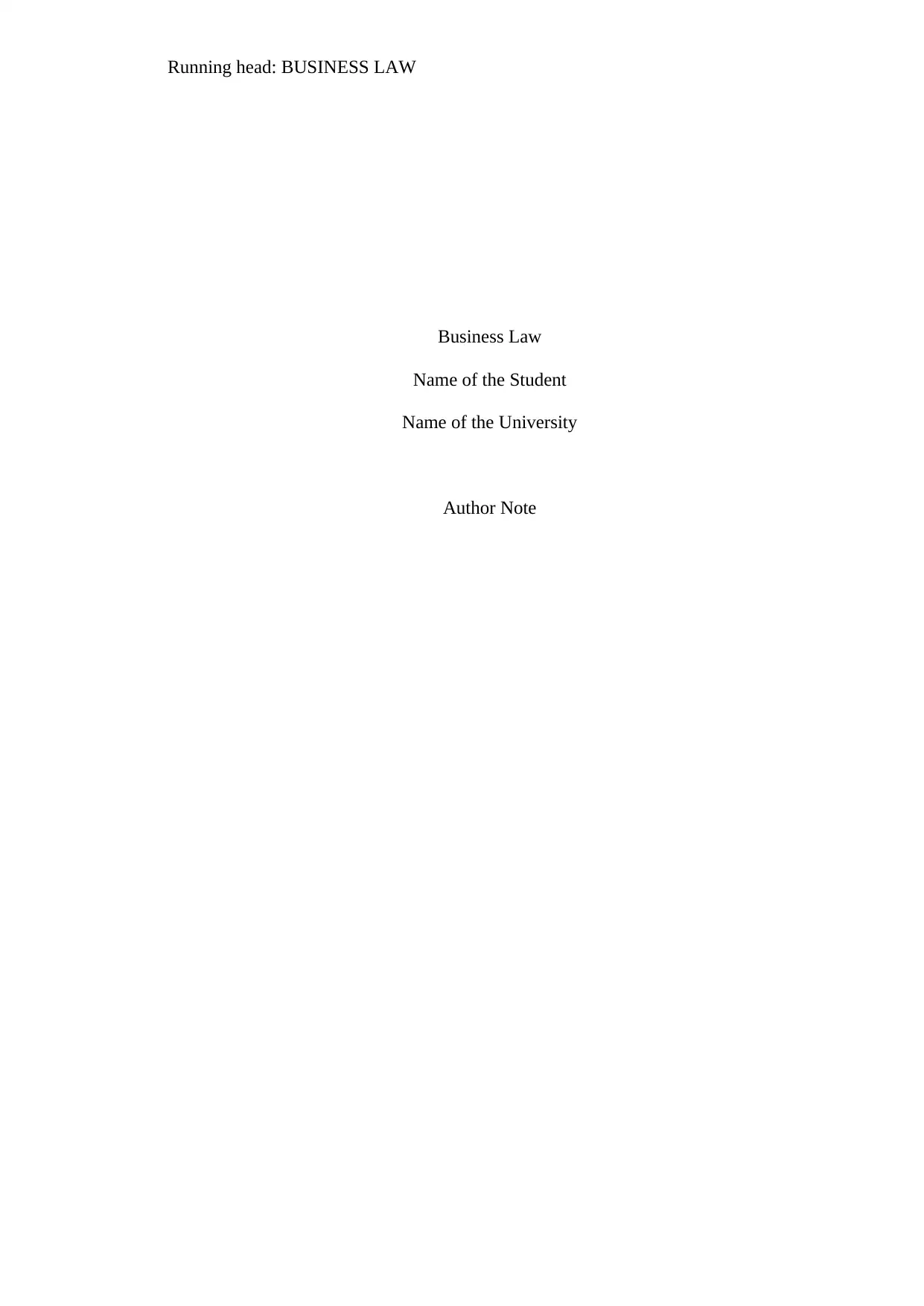
Running head: BUSINESS LAW
Business Law
Name of the Student
Name of the University
Author Note
Business Law
Name of the Student
Name of the University
Author Note
Paraphrase This Document
Need a fresh take? Get an instant paraphrase of this document with our AI Paraphraser
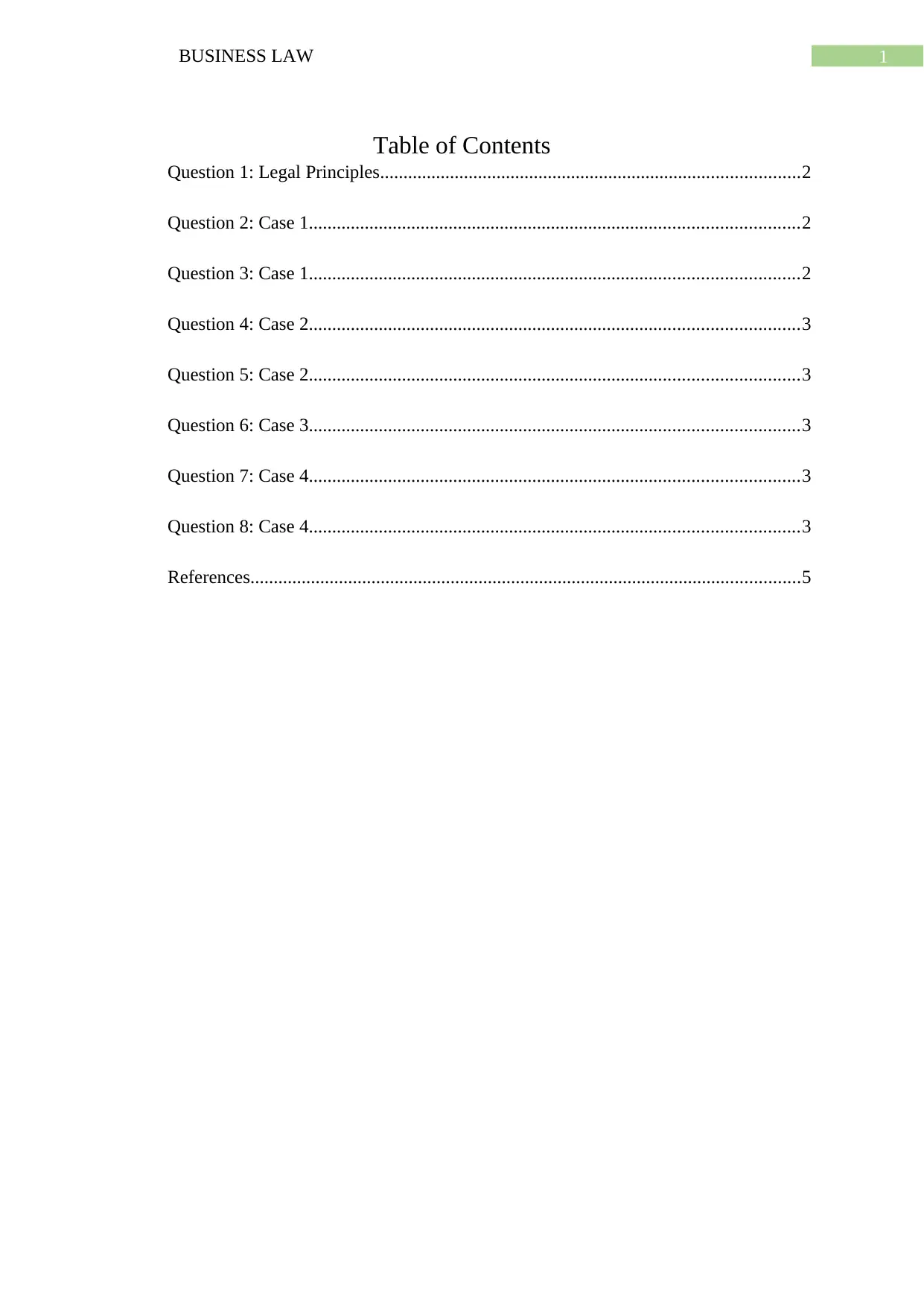
1BUSINESS LAW
Table of Contents
Question 1: Legal Principles..........................................................................................2
Question 2: Case 1.........................................................................................................2
Question 3: Case 1.........................................................................................................2
Question 4: Case 2.........................................................................................................3
Question 5: Case 2.........................................................................................................3
Question 6: Case 3.........................................................................................................3
Question 7: Case 4.........................................................................................................3
Question 8: Case 4.........................................................................................................3
References......................................................................................................................5
Table of Contents
Question 1: Legal Principles..........................................................................................2
Question 2: Case 1.........................................................................................................2
Question 3: Case 1.........................................................................................................2
Question 4: Case 2.........................................................................................................3
Question 5: Case 2.........................................................................................................3
Question 6: Case 3.........................................................................................................3
Question 7: Case 4.........................................................................................................3
Question 8: Case 4.........................................................................................................3
References......................................................................................................................5
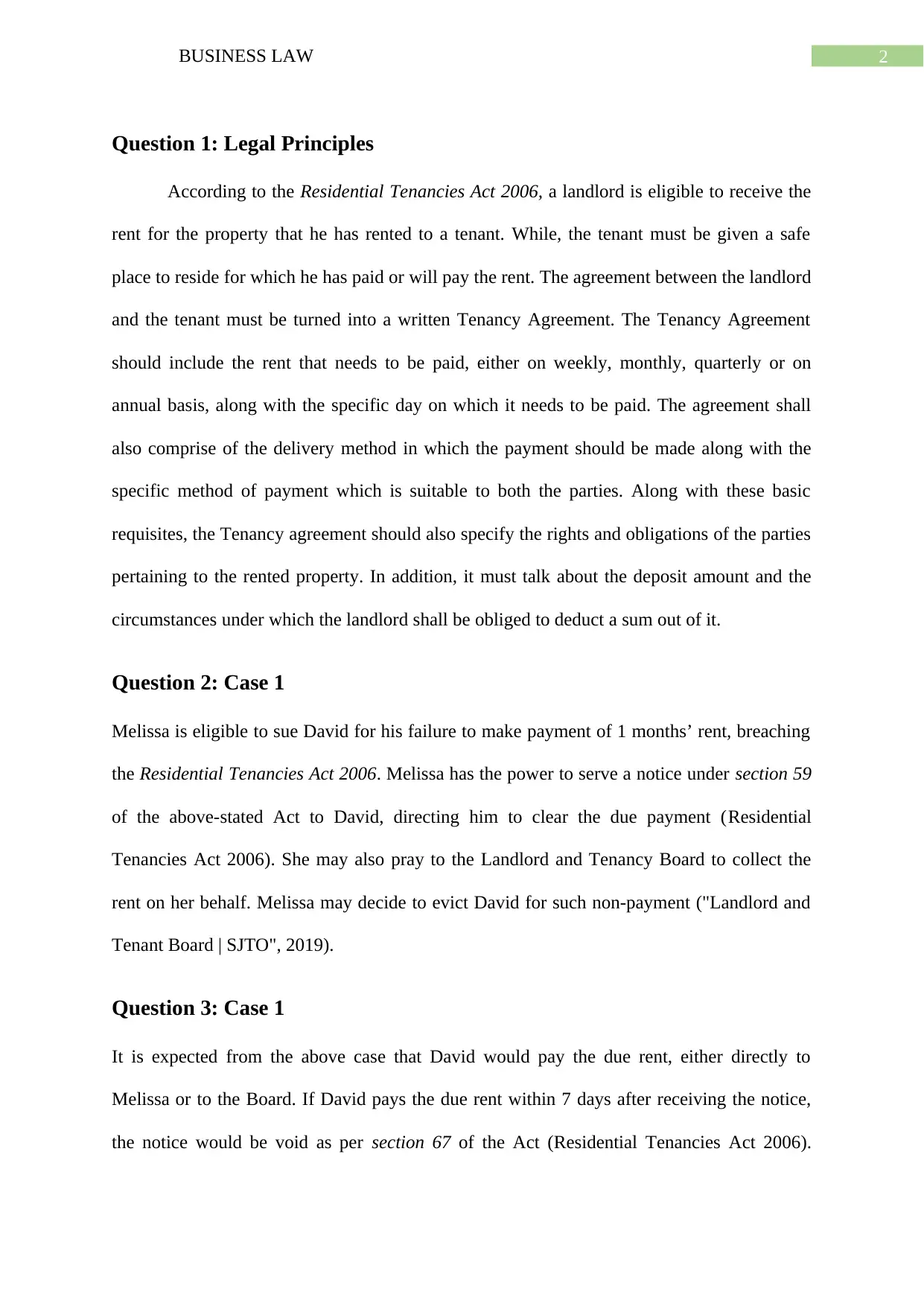
2BUSINESS LAW
Question 1: Legal Principles
According to the Residential Tenancies Act 2006, a landlord is eligible to receive the
rent for the property that he has rented to a tenant. While, the tenant must be given a safe
place to reside for which he has paid or will pay the rent. The agreement between the landlord
and the tenant must be turned into a written Tenancy Agreement. The Tenancy Agreement
should include the rent that needs to be paid, either on weekly, monthly, quarterly or on
annual basis, along with the specific day on which it needs to be paid. The agreement shall
also comprise of the delivery method in which the payment should be made along with the
specific method of payment which is suitable to both the parties. Along with these basic
requisites, the Tenancy agreement should also specify the rights and obligations of the parties
pertaining to the rented property. In addition, it must talk about the deposit amount and the
circumstances under which the landlord shall be obliged to deduct a sum out of it.
Question 2: Case 1
Melissa is eligible to sue David for his failure to make payment of 1 months’ rent, breaching
the Residential Tenancies Act 2006. Melissa has the power to serve a notice under section 59
of the above-stated Act to David, directing him to clear the due payment (Residential
Tenancies Act 2006). She may also pray to the Landlord and Tenancy Board to collect the
rent on her behalf. Melissa may decide to evict David for such non-payment ("Landlord and
Tenant Board | SJTO", 2019).
Question 3: Case 1
It is expected from the above case that David would pay the due rent, either directly to
Melissa or to the Board. If David pays the due rent within 7 days after receiving the notice,
the notice would be void as per section 67 of the Act (Residential Tenancies Act 2006).
Question 1: Legal Principles
According to the Residential Tenancies Act 2006, a landlord is eligible to receive the
rent for the property that he has rented to a tenant. While, the tenant must be given a safe
place to reside for which he has paid or will pay the rent. The agreement between the landlord
and the tenant must be turned into a written Tenancy Agreement. The Tenancy Agreement
should include the rent that needs to be paid, either on weekly, monthly, quarterly or on
annual basis, along with the specific day on which it needs to be paid. The agreement shall
also comprise of the delivery method in which the payment should be made along with the
specific method of payment which is suitable to both the parties. Along with these basic
requisites, the Tenancy agreement should also specify the rights and obligations of the parties
pertaining to the rented property. In addition, it must talk about the deposit amount and the
circumstances under which the landlord shall be obliged to deduct a sum out of it.
Question 2: Case 1
Melissa is eligible to sue David for his failure to make payment of 1 months’ rent, breaching
the Residential Tenancies Act 2006. Melissa has the power to serve a notice under section 59
of the above-stated Act to David, directing him to clear the due payment (Residential
Tenancies Act 2006). She may also pray to the Landlord and Tenancy Board to collect the
rent on her behalf. Melissa may decide to evict David for such non-payment ("Landlord and
Tenant Board | SJTO", 2019).
Question 3: Case 1
It is expected from the above case that David would pay the due rent, either directly to
Melissa or to the Board. If David pays the due rent within 7 days after receiving the notice,
the notice would be void as per section 67 of the Act (Residential Tenancies Act 2006).
⊘ This is a preview!⊘
Do you want full access?
Subscribe today to unlock all pages.

Trusted by 1+ million students worldwide
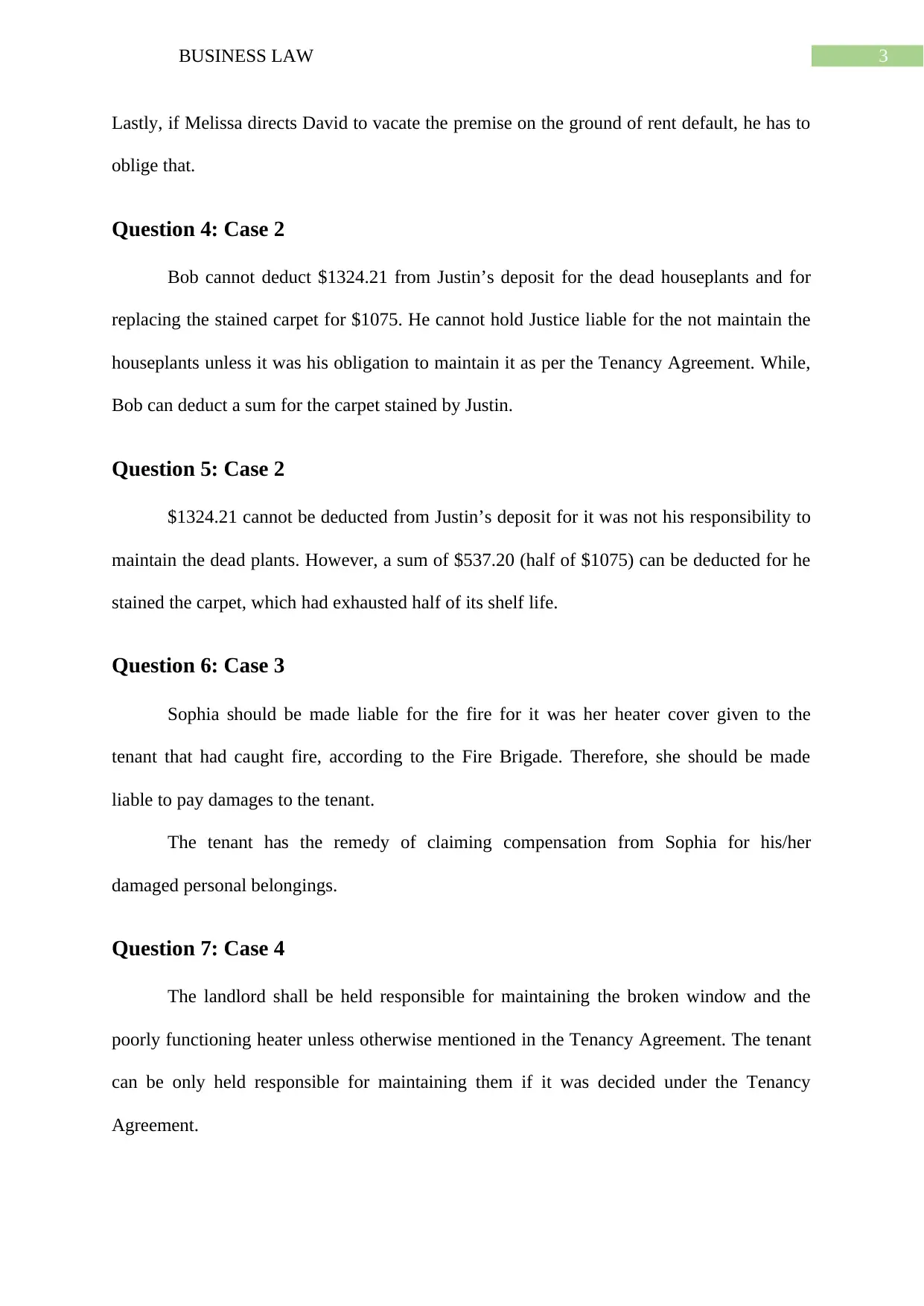
3BUSINESS LAW
Lastly, if Melissa directs David to vacate the premise on the ground of rent default, he has to
oblige that.
Question 4: Case 2
Bob cannot deduct $1324.21 from Justin’s deposit for the dead houseplants and for
replacing the stained carpet for $1075. He cannot hold Justice liable for the not maintain the
houseplants unless it was his obligation to maintain it as per the Tenancy Agreement. While,
Bob can deduct a sum for the carpet stained by Justin.
Question 5: Case 2
$1324.21 cannot be deducted from Justin’s deposit for it was not his responsibility to
maintain the dead plants. However, a sum of $537.20 (half of $1075) can be deducted for he
stained the carpet, which had exhausted half of its shelf life.
Question 6: Case 3
Sophia should be made liable for the fire for it was her heater cover given to the
tenant that had caught fire, according to the Fire Brigade. Therefore, she should be made
liable to pay damages to the tenant.
The tenant has the remedy of claiming compensation from Sophia for his/her
damaged personal belongings.
Question 7: Case 4
The landlord shall be held responsible for maintaining the broken window and the
poorly functioning heater unless otherwise mentioned in the Tenancy Agreement. The tenant
can be only held responsible for maintaining them if it was decided under the Tenancy
Agreement.
Lastly, if Melissa directs David to vacate the premise on the ground of rent default, he has to
oblige that.
Question 4: Case 2
Bob cannot deduct $1324.21 from Justin’s deposit for the dead houseplants and for
replacing the stained carpet for $1075. He cannot hold Justice liable for the not maintain the
houseplants unless it was his obligation to maintain it as per the Tenancy Agreement. While,
Bob can deduct a sum for the carpet stained by Justin.
Question 5: Case 2
$1324.21 cannot be deducted from Justin’s deposit for it was not his responsibility to
maintain the dead plants. However, a sum of $537.20 (half of $1075) can be deducted for he
stained the carpet, which had exhausted half of its shelf life.
Question 6: Case 3
Sophia should be made liable for the fire for it was her heater cover given to the
tenant that had caught fire, according to the Fire Brigade. Therefore, she should be made
liable to pay damages to the tenant.
The tenant has the remedy of claiming compensation from Sophia for his/her
damaged personal belongings.
Question 7: Case 4
The landlord shall be held responsible for maintaining the broken window and the
poorly functioning heater unless otherwise mentioned in the Tenancy Agreement. The tenant
can be only held responsible for maintaining them if it was decided under the Tenancy
Agreement.
Paraphrase This Document
Need a fresh take? Get an instant paraphrase of this document with our AI Paraphraser
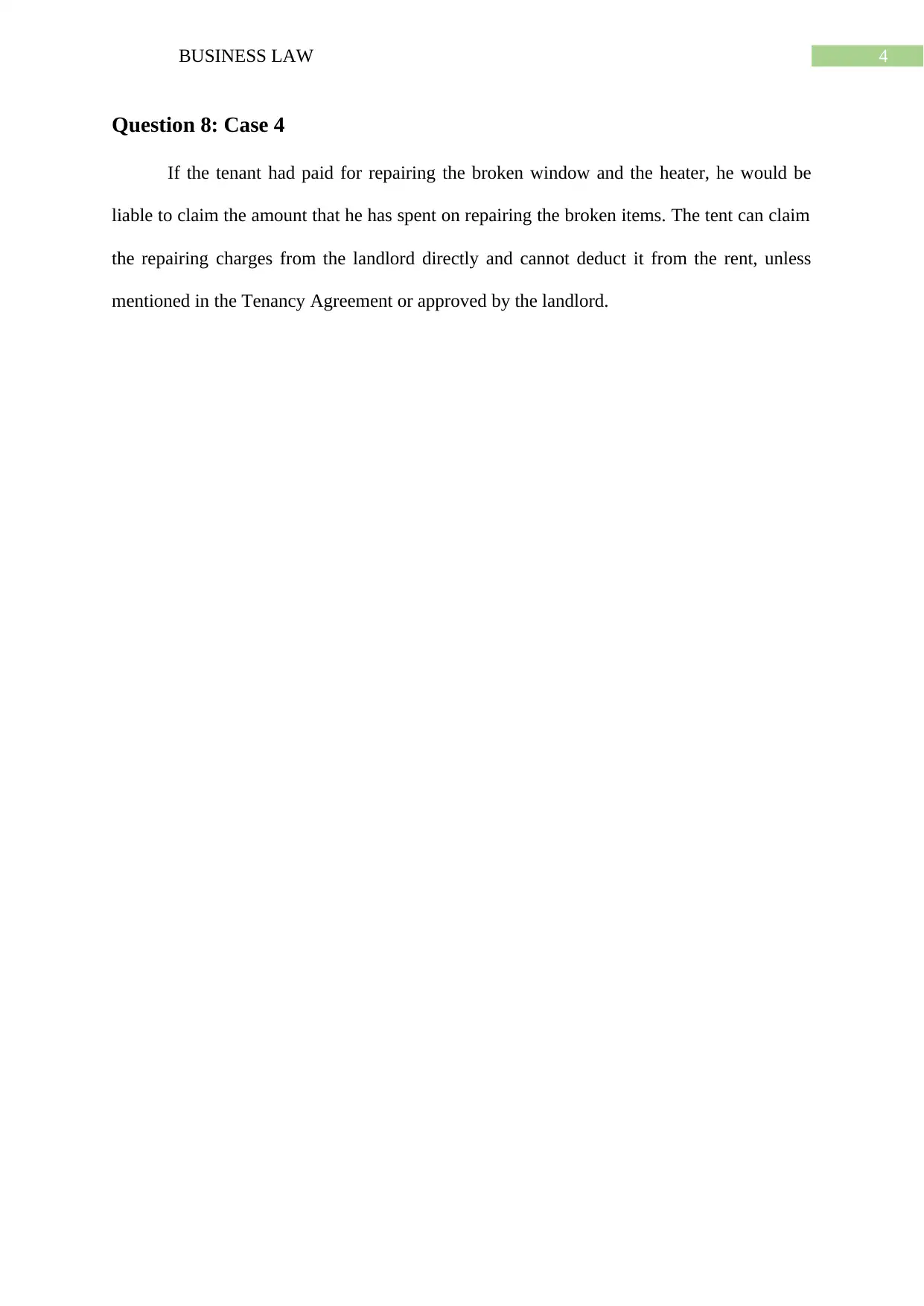
4BUSINESS LAW
Question 8: Case 4
If the tenant had paid for repairing the broken window and the heater, he would be
liable to claim the amount that he has spent on repairing the broken items. The tent can claim
the repairing charges from the landlord directly and cannot deduct it from the rent, unless
mentioned in the Tenancy Agreement or approved by the landlord.
Question 8: Case 4
If the tenant had paid for repairing the broken window and the heater, he would be
liable to claim the amount that he has spent on repairing the broken items. The tent can claim
the repairing charges from the landlord directly and cannot deduct it from the rent, unless
mentioned in the Tenancy Agreement or approved by the landlord.
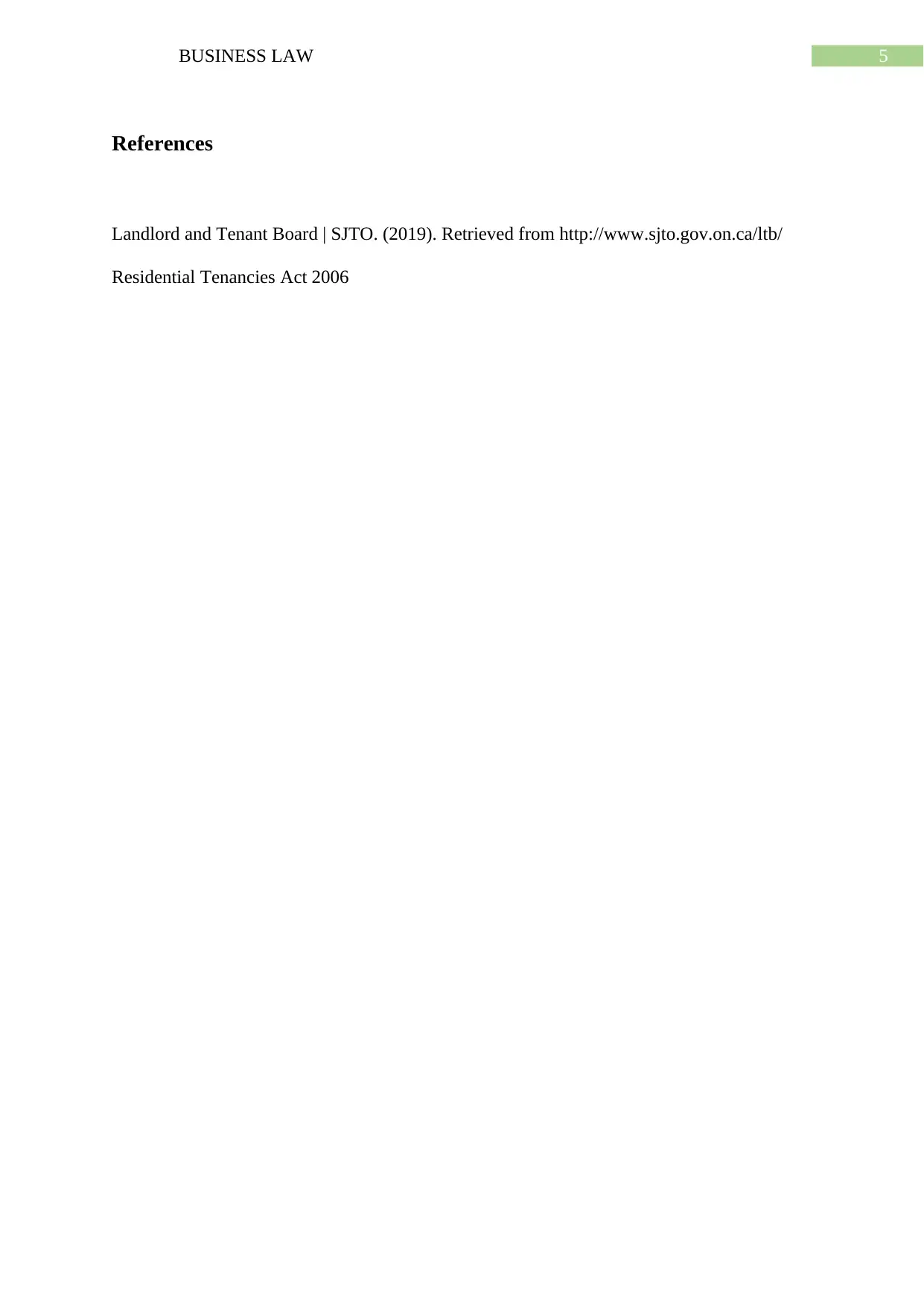
5BUSINESS LAW
References
Landlord and Tenant Board | SJTO. (2019). Retrieved from http://www.sjto.gov.on.ca/ltb/
Residential Tenancies Act 2006
References
Landlord and Tenant Board | SJTO. (2019). Retrieved from http://www.sjto.gov.on.ca/ltb/
Residential Tenancies Act 2006
⊘ This is a preview!⊘
Do you want full access?
Subscribe today to unlock all pages.

Trusted by 1+ million students worldwide
1 out of 6
Related Documents
Your All-in-One AI-Powered Toolkit for Academic Success.
+13062052269
info@desklib.com
Available 24*7 on WhatsApp / Email
![[object Object]](/_next/static/media/star-bottom.7253800d.svg)
Unlock your academic potential
Copyright © 2020–2026 A2Z Services. All Rights Reserved. Developed and managed by ZUCOL.





